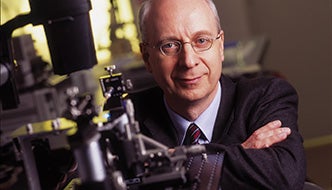The work of Professor E. Fred Schubert was cited by the Royal Swedish Academy of Sciences earlier this month, when the group announced the winners of the 2014 Nobel Prize in physics.
The prize went to the three inventors of the blue light-emitting diode (LED). To explain the science and significance of blue LEDs, the Royal Swedish Academy of Sciences prepared and published a “Scientific Background” article and a “Popular Science Background” article. Both articles reference work by Schubert.

A globally recognized expert in compound semiconductor materials and devices, Fred Schubert has made pioneering contributions to the field of LED technology.
The Scientific Background article cites Schubert’s 2006 book, “Light-Emitting Diodes, 2nd Edition” as a source on the history of LEDs. The Popular Science Background article cites a scientific paper co-authored by Schubert, “Solid-State Light Sources Getting Smart,” published in 2005 in the journal Science.
Schubert is the Wellfleet Senior Constellation Professor in the Department of Electrical, Computer, and Systems Engineering, with a joint appointment in the Department of Physics, Applied Physics, and Astronomy.
A globally recognized expert in compound semiconductor materials and devices, Schubert has made pioneering contributions to the field of LED technology. He is the author of three books, several book chapters, and more than 300 papers published in scientific journals, and the inventor or co-inventor of 35 patents issued in the United States.
Schubert’s accomplishments include the discovery and first analysis of alloy broadening, the development of delta-doped structures, superlattice doping in p-type gallium nitride and aluminium for increased acceptor activation, compositional parabolic grading for elimination of band discontinuities in unipolar heterojunctions, and crystallographic etching of gallium nitride.
He is a fellow of the Institute of Electrical and Electronics Engineers, the American Physical Society, the Optical Society of America, and the International Society for Optical Engineering. Schubert’s other recognitions include a Senior Research Award from the Humboldt Foundation, Discover magazine’s Discover Award for Technological Innovation, Research & Development magazine’s R&D 100 Award, and Boston University’s Provost Innovation Fund Award.
Schubert earned his bachelor’s, master’s, and doctoral degrees, all in electrical engineering, from the University of Stuttgart in Germany.


